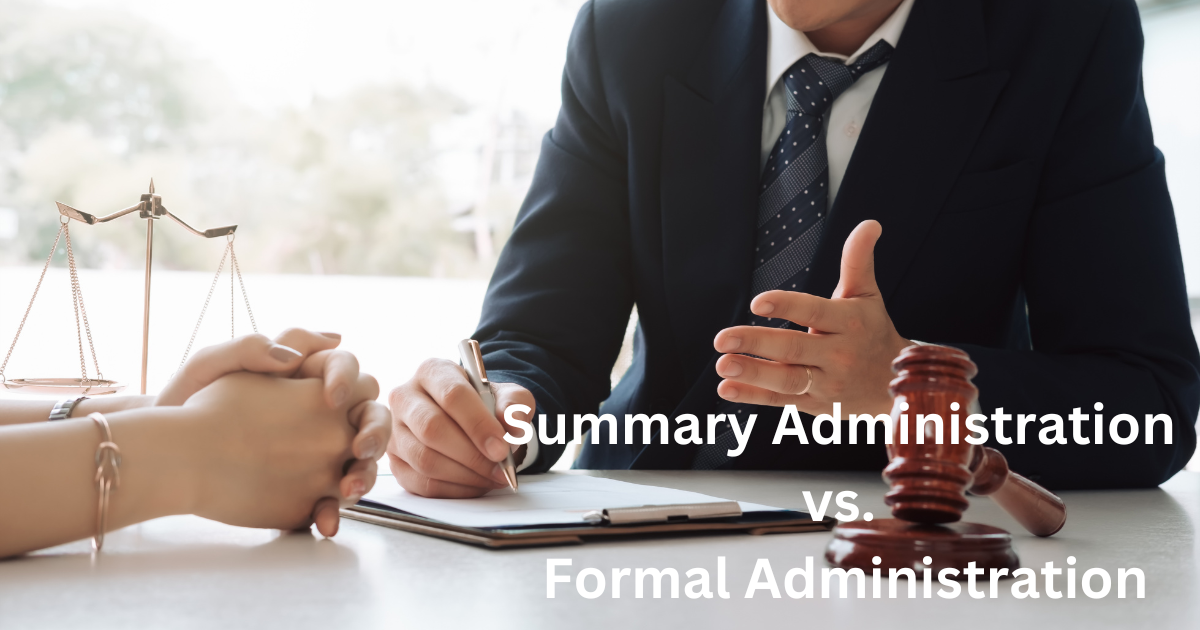
When facing the pivotal decision choosing summary vs formal administration in probate, several factors emerge as crucial considerations, aligning with the intricacies of estate settlement in Florida.
Size and Complexity of the Estate:
The magnitude and intricacy of the estate serve as pivotal determinants in selecting the appropriate administration method. Summary administration florida, typically earmarked for smaller estates with streamlined distribution plans, contrasts with formal administration, which adeptly manages larger estates laden with diverse assets, intricate financial structures, or potential beneficiary disputes.
When considering the size and complexity of the estate, several crucial factors come into play.
- Estate Size: The total value of the estate is a primary consideration. Larger estates with substantial assets, complex financial structures, and diverse investments may be more suitable for formal administration, given the need for a comprehensive and structured approach to manage all the intricacies involved.
- Asset Diversity: Estates with a wide range of assets, such as real estate properties, business interests, investment portfolios, or international holdings, may require the more extensive procedures and oversight provided by formal administration, as opposed to the streamlined process of summary administration.
- Financial Obligations: Complex financial obligations, such as outstanding debts, mortgages, or tax liabilities, can significantly influence the administration method chosen, as they may necessitate the structured and supervised approach of formal administration to ensure all financial matters are appropriately addressed.
- Beneficiary Disputes: The potential for beneficiary disputes or contested claims within the estate could warrant the use of formal administration to provide a more rigorous framework for addressing and resolving such conflicts, ensuring a fair and equitable distribution of assets.
In summary, the size and complexity of the estate play a pivotal role in determining whether summary or formal administration is the most suitable approach, as each method is tailored to address the specific demands and intricacies of different estate scenarios.
Presence of Creditors and Outstanding Debts:
Creditors or unresolved debts greatly influence selecting between summary and formal administration methods for estate settlement. Summary administration may prove insufficient if substantial debts demand settlement, as formal administration offers a systematic avenue for addressing creditors’ claims and ensuring equitable asset distribution as per Florida probate laws.
When the presence of creditors and outstanding debts is a significant factor in the estate settlement, it profoundly impacts the choice between summary and formal administration methods. Here’s a detailed expansion on this crucial aspect:
- Creditor Impact: The existence of creditors and unresolved debts introduces complexities to the estate settlement process. Summary administration, while suitable for estates with minimal outstanding debts, may prove inadequate when substantial creditor claims require settlement. Formal administration ensures systematic resolution of claims and equitable asset distribution by Florida probate laws.
- Debt Settlement: Utilize formal administration to manage and satisfy substantial debts, navigating intricate procedures for financial obligation settlement. Formal administration ensures creditor claims are addressed, preserving estate settlement integrity through comprehensive oversight and legal structure.
- Equitable Asset Distribution: Formal administration addresses creditor claims and ensures equitable asset distribution, complying with Florida probate laws. This structured approach safeguards creditor and beneficiary interests, fostering transparency and fairness in the estate settlement process.
- Legal Compliance: Formal administration systematically complies with legal requirements for settling creditors’ claims and outstanding debts in the estate. This is especially vital when the estate’s financial obligations are complex and require meticulous and supervised resolution.
In conclusion, the presence of creditors and outstanding debts significantly influences the choice between summary and formal administration methods, highlighting the importance of selecting an appropriate approach that can effectively address these financial complexities, ensure legal compliance, and facilitate equitable asset distribution in line with Florida probate laws.
Time Constraints and Expediency:
The urgency of the estate settlement process often steers the choice between summary and formal administration. Summary administration, known for its swiftness, is a preferred option when time is of the essence. For instance, beneficiaries may urgently require asset access, or estate assets may face depreciation risks. If meticulous dispute resolution and oversight are crucial, individuals may choose formal administration despite the prolonged process.
- Estate settlement urgency guides choice between summary and formal administration, leveraging swiftness or meticulous oversight as needed.
- Summary administration is ideal for urgent asset access, safeguarding against estate asset depreciation risks.
- Formal administration, despite being prolonged, is chosen for meticulous dispute resolution and essential oversight.
Complexity of Asset Distribution:
The complexity inherent in asset distribution and the presence of specific bequests or conditions exert a considerable influence on the administration method preference. Formal administration offers a structured framework adept at addressing intricate distribution plans, ensuring meticulous adherence to all legal stipulations and the decedent’s wishes. In cases involving unique or complex distribution arrangements, formal administration emerges as the apt choice to safeguard compliance with estate directives.
Preferences of Beneficiaries and Interested Parties:
The preferences articulated by beneficiaries and other involved parties serve as pivotal determinants in the administration method selection. Summary administration accelerates resolution, but beneficiaries may opt for formal administration due to its transparency in asset distribution and disputes.
Cost Considerations:
A judicious evaluation of costs associated with each administration method is indispensable. Summary administration typically entails lower expenses, given its streamlined legal procedures and reduced court oversight. Nonetheless, the cost-effectiveness of summary administration must be balanced against the protective benefits formal administration offers, including fortified defenses against creditor claims and disputes.
Read more about:
What are Durable Power of Attorneys.
Legal Requirements and Eligibility Criteria:
A comprehensive understanding of the legal prerequisites and eligibility criteria for summary and formal administration is imperative. Summary administration, restricted to estates meeting specific Florida law criteria, may not be viable in all scenarios. Conversely, formal administration may be mandated if summary administration isn’t feasible or if the court deems it necessary for resolving intricate issues.
By meticulously weighing these factors and seeking counsel from legal professionals, individuals can chart a discerning course, ensuring the selected administration method harmonizes with the unique contours of their estate. Each case bears its distinct complexion, and a thoughtful deliberation of these considerations promises a probate process that not only navigates adeptly but also meticulously attends to the needs of all involved parties.
 Daily Blogger News Stay updated with the latest trends and insights. Your reliable source for daily updates and information.
Daily Blogger News Stay updated with the latest trends and insights. Your reliable source for daily updates and information.





